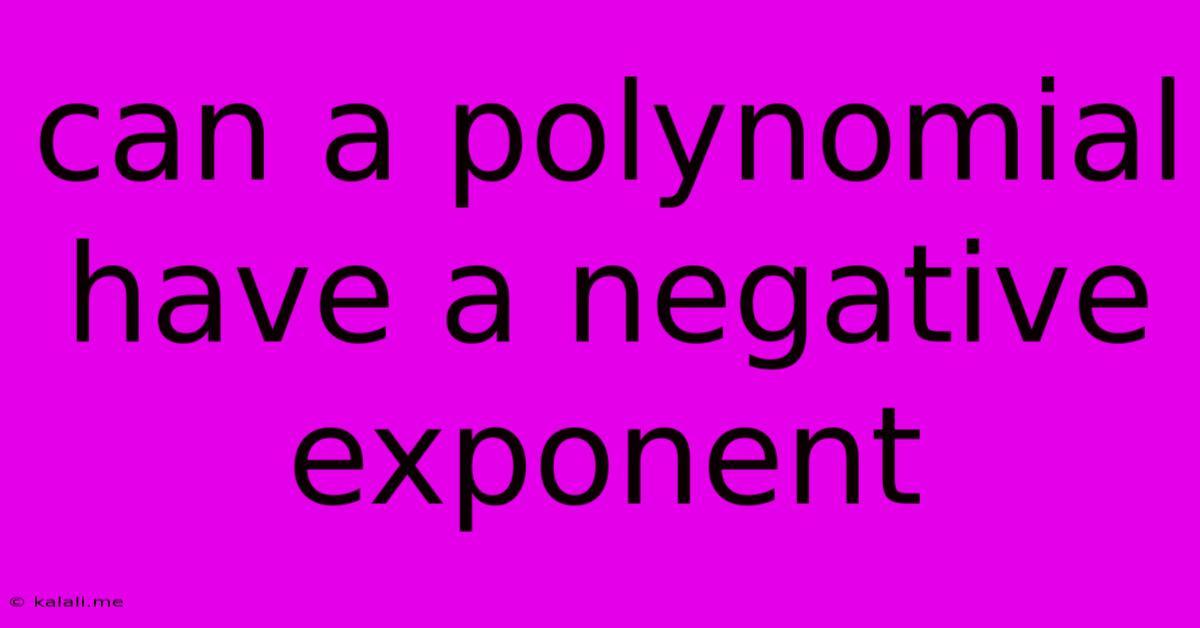Can A Polynomial Have A Negative Exponent
Kalali
Jun 08, 2025 · 3 min read

Table of Contents
Can a Polynomial Have a Negative Exponent?
Meta Description: Discover the definitive answer to the question: can a polynomial have negative exponents? We explore the definition of polynomials and why negative exponents are excluded. Learn about the key characteristics that distinguish polynomials from other algebraic expressions.
Polynomials are fundamental algebraic expressions that form the building blocks of many mathematical concepts. Understanding their properties is crucial for anyone studying algebra, calculus, or related fields. A common question that arises, especially for those new to the subject, is whether a polynomial can have a negative exponent. The simple answer is no. Let's delve deeper into why this is the case.
Defining a Polynomial
A polynomial is defined as an expression consisting of variables and coefficients, involving only the operations of addition, subtraction, multiplication, and non-negative integer exponents of variables. This definition highlights several key characteristics:
- Variables: Polynomials contain variables, usually represented by letters like x, y, or z.
- Coefficients: These are the numerical values multiplying the variables.
- Exponents: The exponents of the variables must be non-negative integers (0, 1, 2, 3, and so on). This is a crucial defining feature.
- Operations: Only addition, subtraction, and multiplication are allowed. Division by a variable is not permitted.
Why Negative Exponents are Excluded
The presence of a negative exponent fundamentally changes the nature of the expression. Consider the term x⁻¹. This is equivalent to 1/x, representing a rational function, not a polynomial. Rational functions are a different class of expressions with their own unique properties. Including negative exponents would break the definition and properties of polynomials.
For instance, polynomials exhibit specific behaviors regarding their graphs and their behavior as x approaches infinity or negative infinity. These behaviors are directly linked to the non-negative integer exponents. Allowing negative exponents would disrupt these predictable patterns.
Examples of Polynomials and Non-Polynomials
Let's clarify the distinction with some examples:
Polynomials:
- 3x² + 2x - 5
- 4y⁴ - 7y + 1
- x⁵ + 2x³ - x + 9
- 7 (a constant is a polynomial of degree 0)
Non-Polynomials (due to negative exponents):
- x⁻² + 2x (contains x⁻²)
- 5x³ + 2x⁻¹ - 1 (contains x⁻¹)
- 1/x + x² (equivalent to x⁻¹ + x²)
- 2/y³ (equivalent to 2y⁻³)
Other Related Algebraic Expressions
It's important to note that many other types of algebraic expressions exist, including rational functions (ratios of polynomials), power functions (expressions of the form xⁿ where n can be any real number), and exponential functions (expressions of the form aˣ where a is a constant). While these share similarities with polynomials, they differ significantly due to the inclusion of operations or exponents not allowed in polynomial expressions.
Conclusion
In summary, a polynomial, by its very definition, cannot have a negative exponent. The presence of a negative exponent transforms the expression into a different type of algebraic function, such as a rational function. Understanding this distinction is key to mastering algebraic manipulation and problem-solving. Remember the defining characteristics: non-negative integer exponents, variables, coefficients, and the limited operations of addition, subtraction, and multiplication.
Latest Posts
Latest Posts
-
Photoshop Transfer Only The Texture From One Layer To Another
Jun 08, 2025
-
How To Say Pie In Spanish
Jun 08, 2025
-
Why Does My Car Rev Up When I Start It
Jun 08, 2025
-
How Did Luke The Apostle Die
Jun 08, 2025
-
My Love For Life In Spanish
Jun 08, 2025
Related Post
Thank you for visiting our website which covers about Can A Polynomial Have A Negative Exponent . We hope the information provided has been useful to you. Feel free to contact us if you have any questions or need further assistance. See you next time and don't miss to bookmark.